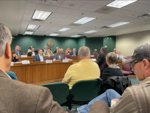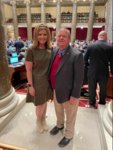A hearing was held at the Missouri State Capitol building in Jefferson City on Thursday, March 23, 2023. The hearing was attended by several members of public from Audrain, Callaway, and Monroe …
This item is available in full to subscribers.
We have recently launched a new and improved website. To continue reading, you will need to either log into your subscriber account, or purchase a new subscription.
If you are a digital subscriber with an active subscription, or you are a print subscriber who had access to our previous website, then you already have an account here. Just reset your password if you have not yet logged in to your account on this new site.
If you are a current print subscriber and did not have a user account on our previous website, you can set up a free website account by clicking here.
Otherwise, click here to view your options for subscribing.
Please log in to continue |


A hearing was held at the Missouri State Capitol building in Jefferson City on Thursday, March 23, 2023. The hearing was attended by several members of public from Audrain, Callaway, and Monroe County, incouding members of the county courts of each county.
The first bill, House Bill 1044 was on increasing the number of members on the Public Service Commission from 5 to 11 with representation from all the congressional districts with 3 members being from agriculture.
This has become a hot button issue in the 43rd district due to Grain Belt Express being classified as a utility and thus allowing land to be taken by eminent domain for their route, The Tiger Connector compounded this issue going from Monroe to Callaway.
One of the opposing testimony heard was based that it is harder to manage a larger board. Representative Kent Haden from Mexico asked if the smaller board was also not easier to manipulate by the larger corporate interest. The Missouri Cattlemen's Association, Audrain County residents Pat Stemme, G.B. Kaiser and Clarissa Cauthorn spoke in favor of the legislation.
Kaiser said in his testimony that having an agriculture background does not only mean farmers as the industry has many positions involved in agriculture including fertilizer companies, bankers who handle rural farm accounts, implement dealers, and more.
Cauthorn discussed the recent PSC commission's public hearing in Mexico where 36 people spoke against the Tiger Connector project. She cited that it was held in the middle of the day, when working people could not attend; with a project that spanned multiple counties, it was only held in one location, making it difficult for senior citizens to find transportation to attend; and the Zoom hearings were skewed against seniors or those in rural areas as it's discussed time and time again about internet reliability in rural America.
Audrain County Associate Commissioner Leslie Meyer spoke in favor of the legislation on behalf of the Audrain County Commission. Roger Fischer, Associate Commissioner of Callaway County and Sid Conklin, Presiding Commissioner of Randolph County both followed the Audrain County Commission's testimony in support of the legislation.
"There is a difference between being familiar with agriculture and having knowledge. When you're sitting down at the Bowling Green sale barn and they bring a bovine into the ring and someone exclaims, 'That is the cutest cow ever!', that is familiarity with agriculture. It's technically correct. However, the person muttering in an annoyed tone under their breath saying, "That's not a cow- it's a bull," well, that person has experience in agriculture," Associate Commissioner Leslie Meyer said. "People who are not in agriculture lack the knowledge to foresee the impact decisions will have on the land, its stewards, and their practices. Yet, we are asking those people to decide the fate of agricultural land. It doesn't seem very fair, does it?", said Audrain County Associate Commissioner Leslie Meyer.
The second bill being proposed is House Bill 1052. This bill is related to changing codifying the ability for solar companies using eminent domain. Due to the intrepretation used in the Grain Belt case eminent domain could be used to take land for solar projects not yet done, however theoretically possible. This bill would prevent his.
Right now in Audrain County, a landowner can choose to work with a solar company, for example, and sign a lease for their 40 acres to go into solar panels. What this legislation will accomplish is prevent that solar company, in the future, from trying to seize the neighbors' properties by eminent domain.
Audrain County resident Pat Stemme testified that her family farm has produced millions in corn over the years. As members of the Poet ethanol plant, part of the corn they raise is turned into energy as a renewable fuel source through ethanol. Before Stemme could finish her testimony, Representative Jeff Knight (R) posed a situation to Stemme. He asked her if her "corporation" produced energy. Stemme corrected him and said her farm was not a corporation, but a family farm. Knight said but your farm produces energy, much like GBE or the solar farms.
"Would you go out and seize your neighbor's property because you produce energy," he said.
"No, I would not and I don't see why companies like GBE can do it to me," Stemme said.
Knight further pointed out the hypocrisy of eminent domain being given to the private companies for producing energy and seizing farm land.